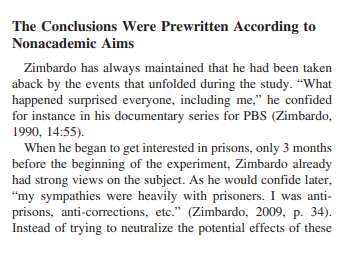Dear psychology colleagues... it's really (past) time for us to have a serious reckoning about the Stanford Prison Experiment. There's not enough useful for us to keep it in our intro curriculum. I haven't taught it in years, but it's still widespread. (Thread) https://twitter.com/RottenInDenmark/status/1341053500407463938
If you're not familiar with the back story, today's episode of the @yourewrongabout podcast does an excellent job of walking through all the issues, without pulling any punches. (We academics can be a bit precious about calling out b.s. sometimes). https://twitter.com/yourewrongabout/status/1341026493401468931?s=20
I teach a big (300) intro psych class every fall, and smaller honors sections occasionally. I've never been enamored with the SPE, although students ask about it every semester. My current textbook presents it without *any* critical lens (to my horror) https://openstax.org/books/psychology/pages/12-2-self-presentation?query=stanford%20prison&target=%7B%22type%22%3A%22search%22%2C%22index%22%3A0%7D#fs-idp90217408
Here are some of the sources for the well-researched and devastating critiques that are summarized in the episode. It's pretty unfortunate that apparently, no American researchers dug into the SPE archives for such a long time. Show notes: https://www.buzzsprout.com/1112270/6933818-the-stanford-prison-experiment
First stop should be this 2019 American Psychologist article by the French professor who appears to be the first? only? researcher to dig into the SPE archives in depth. He wrote a book in French; this is an English-language summary. https://www.gwern.net/docs/psychology/2019-letexier.pdf
This piece by Ben Blum is also pretty devastating, although Zimbardo has stated that "every word of it is a lie." (I'm dubious). https://gen.medium.com/the-lifespan-of-a-lie-d869212b1f62
This content analysis of intro psych textbooks shows that (still), most textbooks teach about it uncritically, or include only mild critiques after first presenting the big (accepted) take-home. https://journals.sagepub.com/doi/full/10.1177/1475725714568007
To my mind, the biggest problem with the study is a fatal flaw that is "hiding in plain sight" , including interviews that PZ himself has given -- dismissal of participants for not "playing the role." That... invalidates the conclusions! https://www.stanforddaily.com/2018/11/13/unchaining-the-stanford-prison-experiment-philip-zimbardos-famous-study-falls-under-scrutiny/
If participants in a supposedly randomly assigned study of human behavior have to be coached in how to act in the artificial scenario in which they are engaged, then conclusions about how that scenario "created" the behavior are obviously invalidated.
I knew quite a bit of this before listening to today's podcast episode, but I learned several things... for example, I did NOT know that Zimbardo had a press release ready to go on day TWO of the study! What!
Now, one slight correction to the episode that I would make as an academic who publishes in scientific journals... the peer review process can take some time. It shouldn't have taken two years, but it's not unusual for preliminary results to be presented at conferences...
... if a professor has done a cool / groundbreaking study, and they've gotten some of the results out, it's not unusual to talk about it before it's been published. But sending out a press release *while still collecting data* is super weird.
And it is clear that the "mythology" of the SPE had been disseminated in the media prior to any results being published / going through the checks of peer review. It is well known in Psych that PZ is a master of using media to promote the field (and himself).
In closing, I would ask my psych colleagues who still might be on the fence to listen to this short podcast episode, where Zimbardo gets really defensive during an interview. Cringe. https://www.vox.com/2018/6/13/17449118/stanford-prison-experiment-fraud-psychology-replication
tl;dr: SPE belongs to the collection of scientifically-outdated cultural footnotes (Freud, Rorschach, Maslow's hierarchy, etc). If we want to be a grown-up science, we need to teach students a better foundation of our field.
This thread / podcast might be of interest to @TeachPsych folks, and I would def. like to talk to the @OpenStax Intro Psych author(s) about doing a major revision of their coverage of the SPE.
Back to that "Zimbardo had a press release on day 2 of the study" -- I cannot get over that -- but don't miss the beginning of this section of the paper. He had developed an interest in prisons... a *whole* 3 months earlier. I see you, white man!

 Read on Twitter
Read on Twitter



